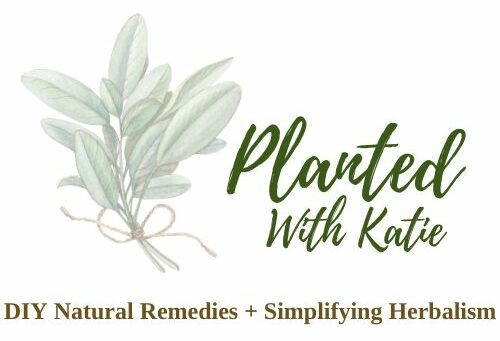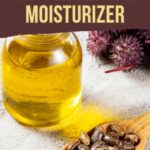Is Castor Oil A Good Moisturizer? How To Use It
Is Castor Oil A Good Moisturizer? YES! Let's learn why and how to use castor oil as a moisturizer for best results.
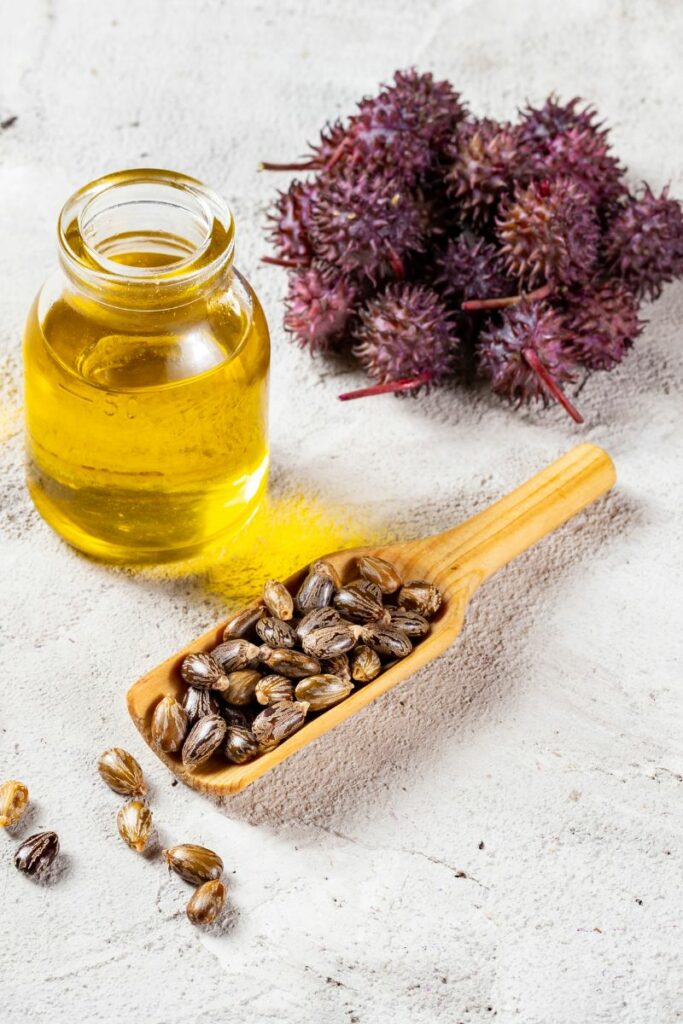
Disclaimer: This is not medical advice. Information and statements shown here are for educational and informational purposes only and are not to replace the advice of your healthcare professional.
This post may include affiliate links. Please refer to our disclaimer for full disclosure.
Have you ever heard about castor oil and wondered if it's good for your skin? Castor oil is a type of vegetable oil that comes from castor beans. It has been used for a long time in many parts of the world, including Ancient Egypt and Eastern Africa. People have used it for different things like skincare, hair growth, and even as a natural laxative.
In this article, we'll explore whether castor oil is a good moisturizer for your skin. You'll learn about its potential benefits, how to use it, and tips for getting the best results. Whether you have dry skin, sensitive skin, or acne-prone skin, castor oil might be a great addition to your skincare routine.
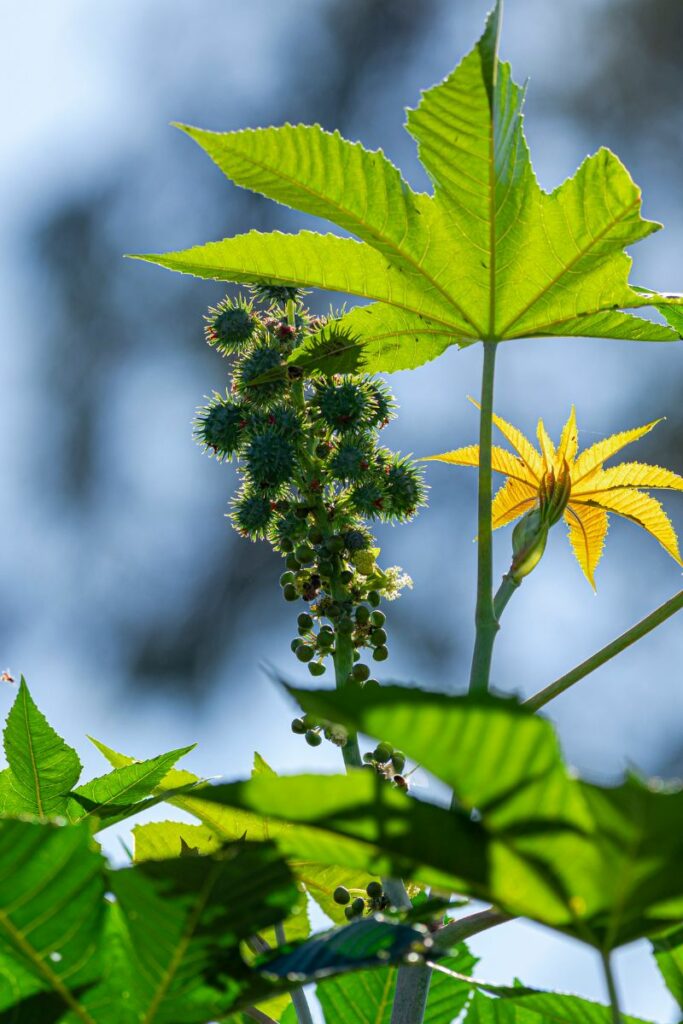
Castor oil is popular on TikTok and other social media platforms for its amazing properties. It's known to help with skin conditions, hair health, and even the appearance of fine lines. Many beauty products and skincare products include castor oil because of its moisturizing properties.
But how do you use castor oil? And is it safe for everyone, including pregnant women? We'll cover all of that, including how to mix it with other natural oils like coconut oil, argan oil, and jojoba oil for even better results.
So, if you're curious about using castor oil for healthy skin and hair, keep reading. We'll dive into everything you need to know about this versatile oil and how it can help you achieve a glowing, moisturized complexion.
What Is Castor Oil?
Castor oil is a vegetable oil that comes from the seeds of the castor oil plant, also known as Ricinus communis. These seeds are commonly called castor beans, but they aren't true beans. The oil is extracted by pressing these seeds, and when it's done without heat, it's called cold-pressed castor oil.
Castor oil has been used for thousands of years. Ancient Egypt was one of the first places where people used castor oil. They applied it as a natural remedy for skin and health conditions and even used it in their beauty routines.
One of the main reasons castor oil is special is because it has a high concentration of ricinoleic acid, a type of fatty acid that has powerful moisturizing properties. This makes it great for skin care products. The oil is thick, which helps it lock in moisture and keep your skin hydrated.
Besides moisturizing, castor oil also has antimicrobial and antibacterial properties. This means it can help fight off germs and bacteria on your skin, reducing the chances of infections and skin irritation. It's also an emollient, which means it can soften and smooth the skin, making it feel nice and supple.
In addition to its benefits for the skin, castor oil is known to help with hair health. It can promote hair growth, strengthen hair follicles, and improve the appearance of fine lines around the eyes and other areas of the face. Some people use it for eyelash growth too.
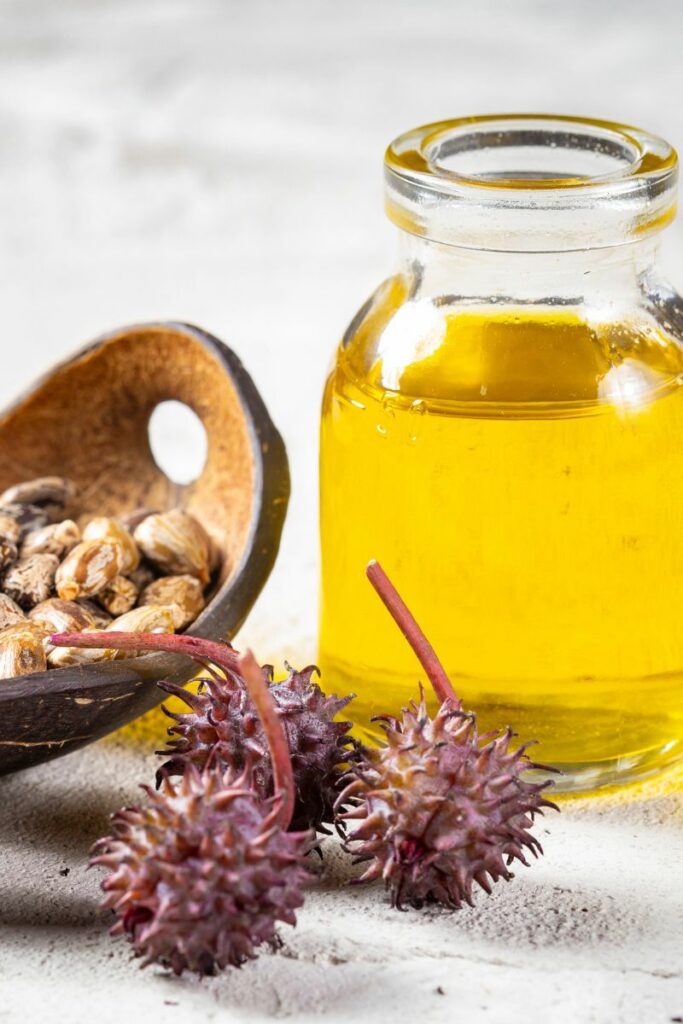
Castor oil is versatile and can be used in various ways. You can find it in many beauty products, including skincare and hair care items. It can also be mixed with other natural oils like coconut oil, jojoba oil, almond oil, and argan oil to enhance its benefits.
However, while castor oil has many potential benefits, it's important to use it correctly. Applying a small amount of castor oil to the affected areas of your skin can help avoid any issues, especially if you have sensitive or acne-prone skin. Always do a patch test first to ensure you don't have an allergic reaction.
In summary, castor oil is a natural ingredient with a rich history and many uses in skincare and hair care routines. Its moisturizing and antimicrobial properties make it a valuable addition to your beauty routine, helping to maintain healthy skin and hair.
Benefits of Castor Oil as a Moisturizer
Castor oil is a vegetable oil that offers many benefits for your skin. Let’s look at how it helps keep your skin healthy and hydrated.
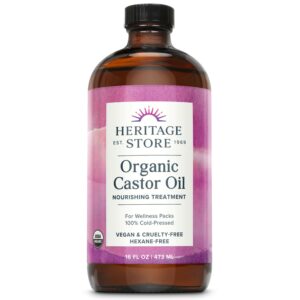
Deep Hydration
Castor oil provides deep hydration for dry skin. It comes from castor beans, which have a high concentration of ricinoleic acid, a type of fatty acid. This makes castor oil thick, so it penetrates deep into the skin, keeping it moist for a long time. A small amount of castor oil can make your skin feel soft and smooth.
Skin Barrier Repair
Your skin has a barrier that protects it from damage. Sometimes this barrier can get weak, leading to dry skin and irritation. Castor oil helps repair this barrier. It forms a protective layer on the skin, preventing moisture loss. This way, your skin stays hydrated and healthy.

Anti-inflammatory Properties
If you have skin irritation or sensitive skin, castor oil can help. It has anti-inflammatory properties, which means it can soothe red, irritated skin. This makes it a good choice for people with conditions like eczema or psoriasis.
Antimicrobial Effects
Castor oil also has antimicrobial properties. This means it can help fight off germs and bacteria that cause skin infections. Using castor oil regularly can keep your skin clean and free from infections, making it a great addition to your skincare routine.
Rich in Nutrients
Castor oil is rich in nutrients that nourish the skin. It contains vitamin E, which helps protect your skin from damage caused by free radicals. It also has other vitamins and minerals that promote healthy skin. These nutrients make castor oil a fantastic natural ingredient for skincare products.
Versatile Oil
You can mix castor oil with other natural oils like coconut oil, argan oil, jojoba oil, and olive oil. These oils, called carrier oils, can enhance the moisturizing properties of castor oil. Mixing these oils can give you the best results for smooth and healthy skin.
In summary, castor oil is a versatile oil with many potential benefits for your skin. It provides deep hydration, repairs the skin barrier, soothes irritation, fights infections, and nourishes your skin with essential nutrients. Adding a little castor oil to your beauty routine can help you achieve healthy, glowing skin.
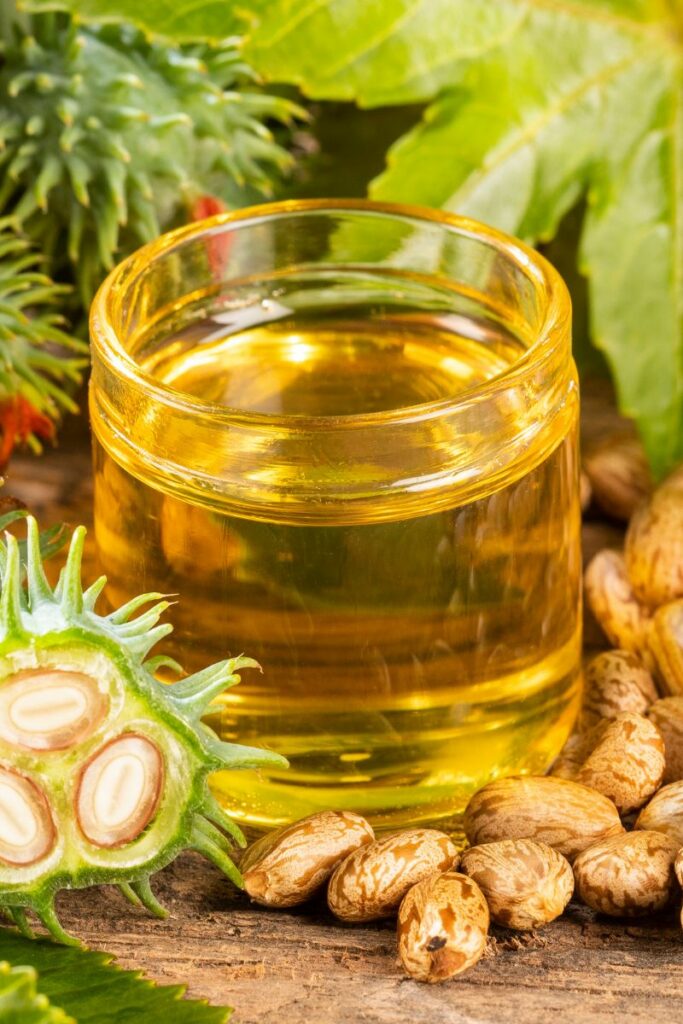
How to Use Castor Oil as a Moisturizer
Preparation
Choosing the right type of castor oil is important for getting the best results. Look for cold-pressed castor oil, which is made by pressing the castor seeds without using heat. This helps keep all the natural ingredients and benefits intact. Organic castor oil is also a good choice because it’s free from pesticides and other harmful chemicals.
Application Methods
Direct Application
Using castor oil directly on your skin is easy. Here’s a step-by-step guide:
- Clean Your Skin: Wash your face or the area you want to moisturize with warm water and a gentle cleanser.
- Dry Your Skin: Pat your skin dry with a clean towel.
- Apply Castor Oil: Take a small amount of castor oil (just a few drops) and rub it between your palms.
- Massage: Gently massage the oil onto your skin in a circular motion.
- Let It Absorb: Leave the oil on your skin for a few minutes to absorb.
Diluted Use
If you find castor oil too thick, you can mix it with other natural oils like coconut oil, jojoba oil, or argan oil. These oils, known as carrier oils, can make the castor oil easier to apply and add extra benefits.
How To Mix Them
- Choose Your Carrier Oil: Pick an oil like coconut oil, jojoba oil, or argan oil.
- Mix the Oils: Combine equal parts of castor oil and your chosen carrier oil in a small bowl.
- Apply: Use the mixture just like you would use pure castor oil. Apply it to your skin and massage gently.
Castor Oil Packs
For deeper hydration, you can use castor oil packs. Here’s how to make one:
- Soak a Cloth: Take a clean cotton cloth or organic castor oil pack and soak it in warm water, then wring it out.
- Apply Castor Oil: Spread a small amount of castor oil on the cloth.
- Place on Skin: Put the cloth on the area you want to moisturize.
- Relax: Leave the pack on for about 20-30 minutes, then remove it and wash your skin with warm water.
Frequency
How often you use castor oil depends on your skin type:
- Dry Skin: Use castor oil 2-3 times a week to keep your skin hydrated.
- Oily or Acne-Prone Skin: Use it once a week to avoid clogging pores.
- Sensitive Skin: Start with once a week and see how your skin reacts. If it feels good, you can increase to twice a week.
Using castor oil regularly can help you achieve healthy skin, thanks to its moisturizing and antimicrobial properties. Always remember to use a small amount to avoid skin irritation and enjoy the benefits of this natural ingredient in your skincare routine.
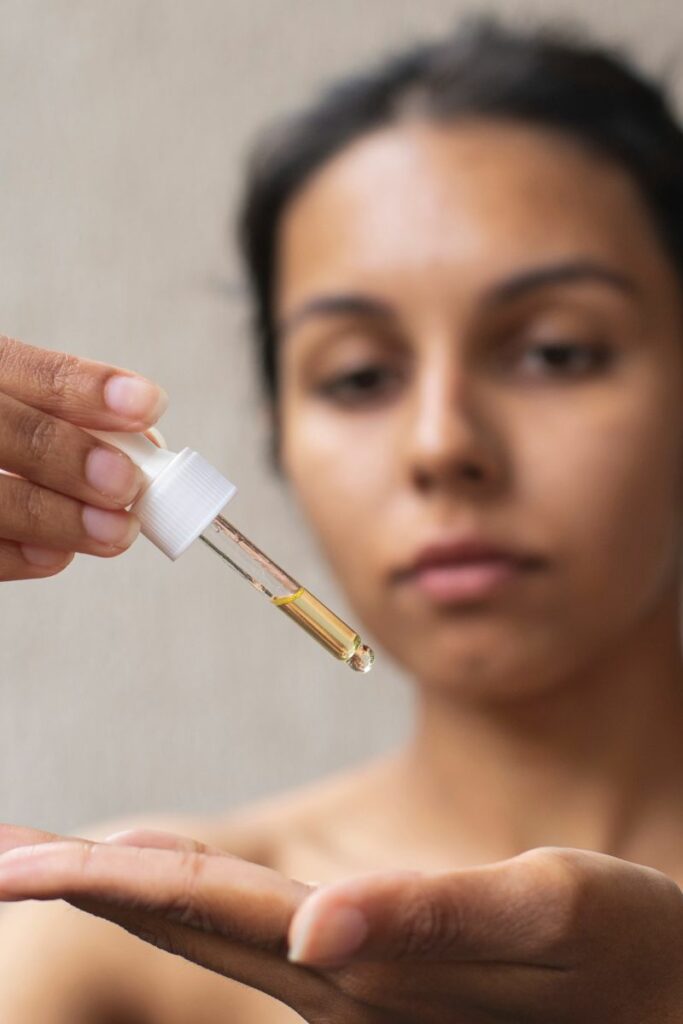
Tips for Using Castor Oil
Using castor oil can be very beneficial for your skin, but there are a few tips to ensure you get the best results. Here’s what you need to know:
Patch Test
Before you start using castor oil on your skin regularly, it’s important to do a patch test. This helps check if you’re allergic to it. Here’s how:
- Apply a Small Amount: Put a drop of castor oil on a small area of your skin, like your wrist or behind your ear.
- Wait: Leave it on for 24 hours.
- Check for Reactions: Look for any signs of redness, itching, or irritation. If your skin is fine, you can safely use castor oil on larger areas.
Best Time to Apply
The best time to apply castor oil is during your nighttime skincare routine. Here’s why:
- Nighttime Application: Your skin repairs itself while you sleep, so applying castor oil at night allows it to work effectively without any interference from makeup or sun exposure.
- Morning Application: If you prefer, you can also use it in the morning, but make sure to use a small amount to avoid a greasy look.
Storage
Storing castor oil properly helps maintain its efficacy and keeps it fresh. Here are some tips:
- Cool, Dark Place: Keep your castor oil in a cool, dark place, like a cupboard. This prevents it from getting too warm or being exposed to light, which can degrade its quality.
- Tightly Sealed: Make sure the bottle is tightly sealed to prevent air from getting in. Exposure to air can cause the oil to go bad more quickly.
- Check Expiry Date: Like all natural ingredients, castor oil has an expiry date. Make sure to check it before using, and don’t use the oil if it smells off or has changed in color.
By following these tips, you can enjoy the many castor oil benefits for healthy skin, hair growth, and more. Just remember to start with a patch test, apply it at the right time, and store it correctly for the best results.
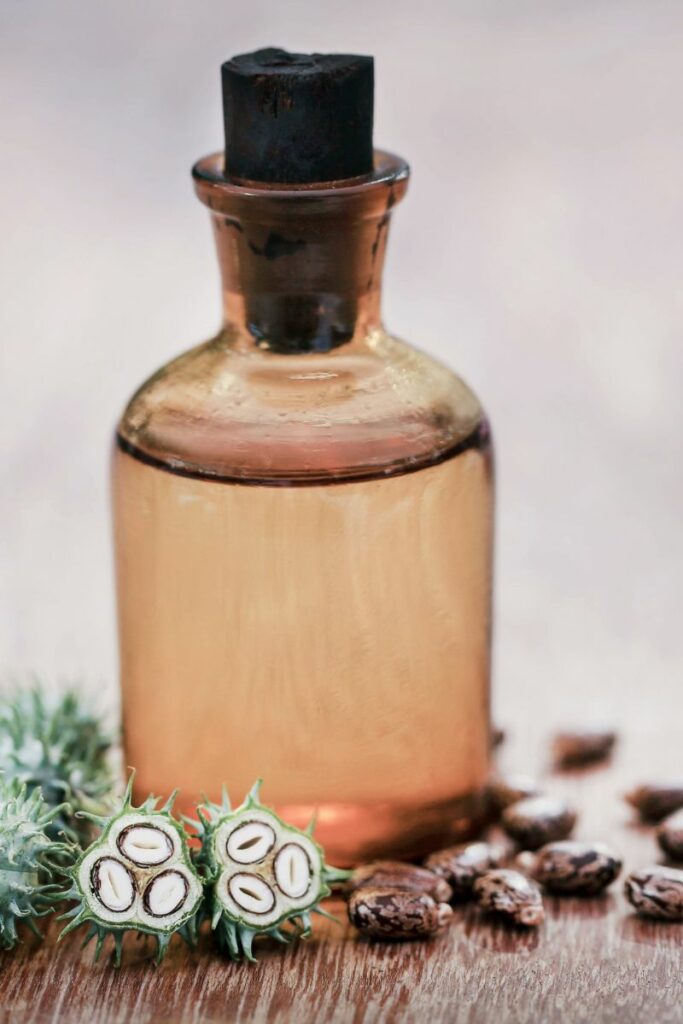
Potential Side Effects and Precautions
While castor oil has many benefits, it's important to be aware of potential side effects and take some precautions. Here’s what you need to know:
Allergic Reactions
Some people might be allergic to castor oil. Here are signs to watch for:
- Redness and Itching: If you notice redness, itching, or swelling where you applied the oil, you might be having an allergic reaction.
- Rash: A rash can also be a sign of an allergy.
What to Do If an Allergy Occurs:
- Stop Using: Immediately stop using castor oil if you notice any of these signs.
- Wash Off: Wash the affected area with warm water and mild soap.
- Seek Help: If the reaction is severe, seek help from a healthcare provider.
Overuse
Using too much castor oil can cause issues. Here are some potential problems:
- Greasy Skin: Applying too much can make your skin greasy and clog your pores, especially if you have oily or acne-prone skin.
- Skin Irritation: Overuse can lead to skin irritation or even worsen existing skin conditions.
How to Avoid Overuse:
- Use a Small Amount: A few drops of castor oil are usually enough.
- Limit Frequency: Start with once or twice a week and see how your skin responds before increasing the frequency.
Skin Type Considerations
Different skin types can react differently to castor oil. Here’s some advice based on your skin type:
- Oily Skin: If you have oily skin, use castor oil sparingly. Too much can clog your pores and cause acne breakouts. Consider mixing it with a lighter carrier oil, like jojoba oil.
- Dry Skin: Castor oil is great for dry skin because of its thick consistency and moisturizing properties. You can use it more frequently, but still, start with a small amount.
- Sensitive Skin: If your skin is sensitive, do a patch test first to make sure you don’t react to the oil. Use it less frequently and mix it with a gentle carrier oil, like almond oil, to reduce the risk of irritation.
By being aware of these potential side effects and taking precautions, you can safely enjoy the benefits of castor oil for your skin. Always start with a small amount and adjust based on how your skin responds to get the best results.
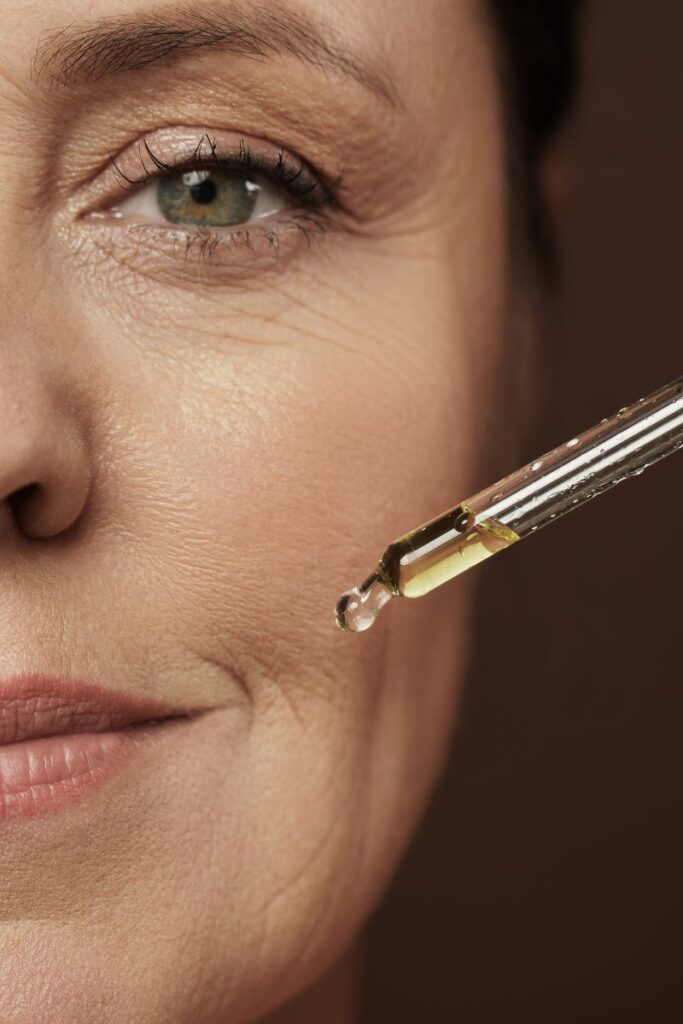
FAQs About Castor Oil as a Moisturizer
Is castor oil safe for all skin types?
Yes, castor oil can be used on different skin types, but it’s important to adjust how you use it based on your skin. Oily skin types should use it sparingly, while dry skin types can use it more frequently. Always do a patch test first, especially if you have sensitive skin.
Can pregnant women use castor oil?
Pregnant women should consult with a healthcare provider before using castor oil, as it can sometimes cause skin irritation and is also known as a stimulant laxative.
Does castor oil help with acne?
Castor oil has antimicrobial properties that can help reduce acne-causing bacteria. However, because of its thick consistency, it can also clog pores if overused. It’s best to use it sparingly on acne-prone skin.
How long does it take to see results from using castor oil?
Results can vary, but with regular use, you might start to see improvements in skin hydration and texture within a few weeks.
Can I use castor oil on my hair as well as my skin?
Yes, castor oil is also great for hair growth and strengthening hair follicles. You can apply it to your scalp and hair for added moisture and to help with hair loss.
Is there a difference between castor oil and Jamaican black castor oil?
Yes, Jamaican black castor oil is processed differently and is often darker and thicker. It’s particularly popular for hair care.
Conclusion
Castor oil is a versatile and powerful vegetable oil that offers many benefits for your skin and hair. From deeply hydrating dry skin to promoting hair growth and reducing skin irritation, castor oil is a natural ingredient worth adding to your skincare routine.
Remember to start with a patch test to ensure you’re not allergic, and use a small amount to avoid greasy skin or clogged pores. Applying castor oil at night can maximize its moisturizing properties, and mixing it with other natural oils like coconut oil, jojoba oil, or argan oil can provide even better results.
While castor oil is generally safe for most people, pregnant women and those with sensitive skin should consult a healthcare provider before use. With regular use, castor oil can help you achieve healthy, glowing skin and strong, beautiful hair.
